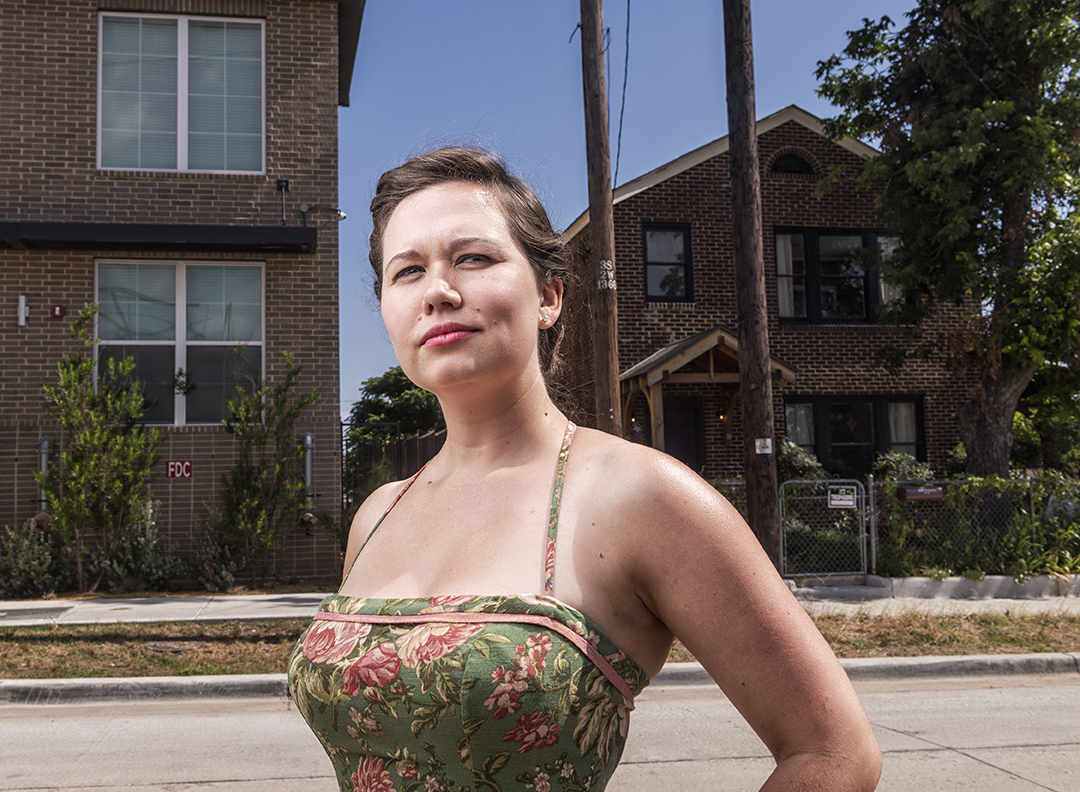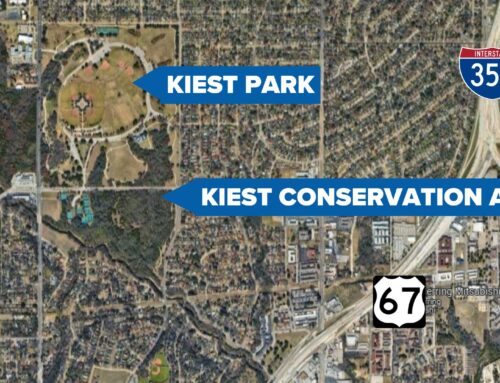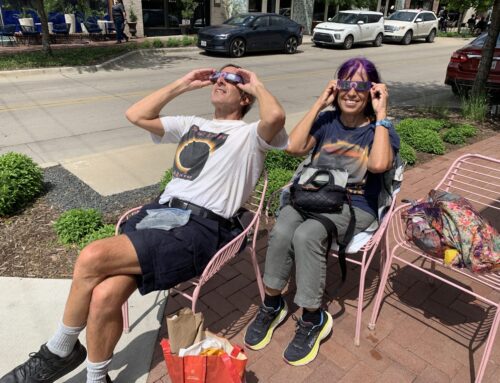
She’s feminine and petite, a fashion designer living her best life in the two-story Bishop Arts duplex she bought in 2009.
This place is ideal for Tracy Popken. She’s 34 but already plans to age in place in her duplex. She loves historic buildings, walking or biking, and living in a tight community. She’s as friendly as a pastor on Sunday morning.
But let just one truck show up nearby to work illegally on a Sunday morning.
Even the folks down at City Hall know: Don’t mess with Tracy Popken.
Think back to what you were doing in May 2016. Now imagine that every day since then, the background of your life is the sound of construction. Jackhammers, diesel engines and backup beepers, earth movers, nail guns and workers hollering, all day long, starting early in the morning, six days a week.
It all started when a developer tore down houses to build the Bishop Highline Apartments next door to Popken’s home and studio on Melba and Madison Avenue. That’s the project she’s struggled with most, but now that it’s done, she’s cool with it.
“I really like my apartment neighbors,” she says.
Then there was about a year’s work on storm drainage, sidewalk, curb and roadway replacement on Madison and Melba. For several months Popken couldn’t leave her house without boots because she was surrounded by rubble.

Here are her tips for living near construction.
Hours
Construction crews are only allowed to work in residential areas from 7 a.m.-7 p.m. Monday-Friday and 8 a.m.-7 p.m. Saturday. Work is not allowed on Sundays, and obtaining a permit for Sunday work requires approval from neighbors.
“Sundays are sacred to me, even though I’m not religious, because they are quiet,” Popken says.
Popken shooed workers away from a Winnetka Heights construction site near the home of a friend one Sunday. “I said, ‘You have 30 minutes to get out of here,’ and they were gone.”
Right to access
Popken put up a “no trespassing” sign with her phone number on it so that surveyors could ask for permission to enter her gate.
“They can’t set one foot on your property without threat of arrest,” she says. “I would come home and find giant footprints in my garden. They were crushing my herbs and un-staking my tomatoes.”
Finally, she called the surveyor.
“I told him, very politely, that the next time he does that, I’m either going to shoot him or have him arrested. He apologized profusely,” Popken says.
The same goes for construction jobs. If their plans require them to step onto an adjacent property, they can ask the property owner for a contract with terms for access. Otherwise, they have to figure it out another way.
Know your property lines
An adjacent developer tried to take 6 inches of Popken’s property, she says. The construction manager was working from a steel pin in the ground that surveyors used 100 years ago to demark property lines. But those pins are not the last word. Popken looked up her plat at the Municipal Building on Jefferson Boulevard and found that the 6 inches are included in her plat and that she’s been paying taxes on them, so they are hers according to Texas law. The developer had to rework the plans.


Road obstruction
Construction and roadwork crews are not allowed to fully close a street without permits and traffic control, such as detour signs and flaggers. They can’t block the road with trucks to load or unload, and they can’t leave massive amounts of construction debris, mud or dust in the road. This one can be hard to enforce, Popken says, but neighbors should call 311 if workers are blocking the road illegally.
Pay attention to the mail
“If someone is applying for a permit to work on Sundays or overnight, or if they’re rezoning, they’re not going to track you down at work and make sure they look you in the eye. They’re going to send you a piece of mail,” Popken says.
“If it doesn’t make sense, call the number on the paper and walk into the office. Do that, because otherwise you’re going to get screwed.”
The Municipal Building and City Hall are intimidating. City Plan Commission meetings are on Thursday afternoons.
“No one finds this convenient,” Popken says. “But you have to do it.”
Anyone can ask to see the files for zoning cases in the Planning and Development office at City Hall and can ask to meet with the planner on the case they’re researching. “The Municipal Building and City Hall are your friends,” Popken says.
Be polite
“Take every excuse to talk to somebody. If you see a City car in front of a construction site, just walk over and talk to them,” Popken says.
She recommends leading with, “What’s going on over here?”
Usually they will tell you.
Once when she struck up a conversation with a code inspector, it suddenly hit him: “You’re that lady. They told me at the office to watch out for you … but you seem really nice.”
When dealing with anyone, she says, she’s polite but firm, and she doesn’t back down.
She is nice. Just don’t mess with her.
See videos and photos of Tracy Popken’s construction woes over the years at oakcliff.advocatemag.com.





